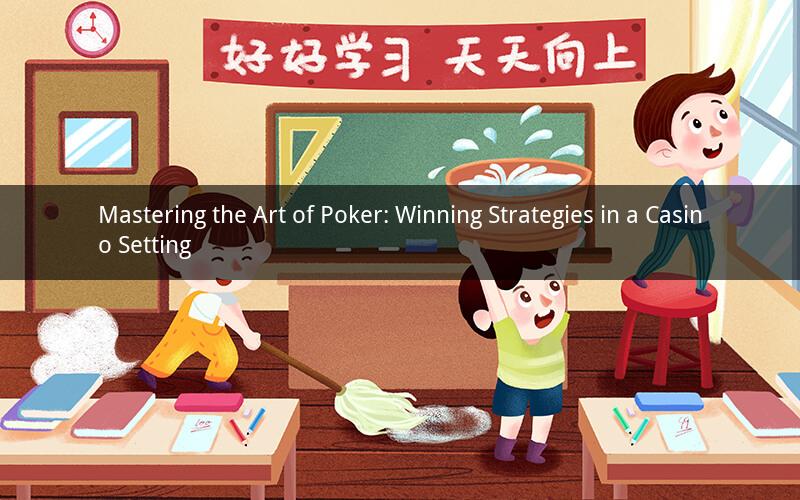
Introduction:
Poker, a game of skill, strategy, and psychological warfare, has long been a favorite pastime in casinos around the world. Whether you're a beginner or a seasoned player, winning at poker in a casino can be a challenging yet rewarding endeavor. This article delves into the essential strategies and tips to help you increase your chances of success at the poker table.
1. Understand the Basics:
Before diving into advanced strategies, it's crucial to have a solid understanding of the basics. Familiarize yourself with the rules of the game, the different types of poker variants, and the hand rankings. This foundational knowledge will serve as the backbone for your poker journey.
2. Choose the Right Table:
Casino poker tables come in various limits and formats. Choose a table that matches your skill level and bankroll. If you're a beginner, start with lower stakes to build your confidence and skills. As you progress, gradually move up to higher stakes for greater challenges and rewards.
3. Study and Analyze:
Successful poker players never stop learning. Utilize online resources, poker forums, and books to expand your knowledge. Analyze your own play as well as that of other players. Look for patterns, tendencies, and mistakes. This continuous learning process will help you evolve as a player and stay ahead of the competition.
4. Manage Your Bankroll:
Bankroll management is a critical aspect of winning at poker. Never play with money you can't afford to lose. Establish a budget and stick to it. Only play at stakes that allow you to play a significant number of hands without depleting your bankroll. This ensures you have the longevity to play your best game.
5. Play Tight-Aggressive:
A tight-aggressive playing style involves playing a limited range of strong hands while being aggressive when you do play. This approach helps to maximize your win rate. Avoid playing too many hands, especially in early position, as it increases the likelihood of facing strong opposition. When you do play, be aggressive and make your opponents pay to see your cards.
6. Bluff Wisely:
Bluffing is a key element of poker, but it must be used strategically. Bluffing is not just about betting with weak hands; it's about creating an illusion and manipulating your opponents' decisions. Pay attention to your opponent's tendencies and adjust your bluffs accordingly. Bluff when you have a chance of winning the pot, and only bluff when you're confident your opponent is likely to fold.
7. Read Your Opponents:
One of the most crucial skills in poker is the ability to read your opponents. Look for physical tells, betting patterns, and other behavioral cues. Understanding your opponents' tendencies can give you an edge and help you make informed decisions at the table.
8. Stay Emotionally Balanced:
Emotional control is essential in poker. Avoid tilt, which is a state of emotional frustration and irrational decision-making. Stay calm, maintain a positive mindset, and don't let your emotions cloud your judgment. If you find yourself feeling tilted, take a break or move to a different table.
9. Adapt to Changing Situations:
Poker is a dynamic game, and what works in one situation may not work in another. Be flexible and adapt your play to the changing dynamics of the table. Pay attention to the evolving tendencies of your opponents and adjust your strategy accordingly.
10. Practice Regularly:
Like any other skill, poker requires practice. Play as often as possible, but prioritize quality over quantity. Practice with different opponents and in various settings to improve your skills and adaptability.
Conclusion:
Winning at poker in a casino requires a combination of skill, strategy, and emotional intelligence. By understanding the basics, choosing the right table, studying and analyzing your play, managing your bankroll, playing tight-aggressive, bluffing wisely, reading your opponents, staying emotionally balanced, adapting to changing situations, and practicing regularly, you can increase your chances of success. Remember, poker is a game of skill, and it takes time and effort to master. Keep honing your skills, and you'll be well on your way to becoming a formidable poker player.
Questions and Answers:
Q1: How can I improve my bankroll management in poker?
A1: To improve your bankroll management, establish a budget, only play at stakes that allow you to play a significant number of hands without depleting your bankroll, and avoid chasing losses.
Q2: What is the best way to read my opponents' tendencies?
A2: Pay attention to their betting patterns, physical tells, and behavior. Look for consistency in their play and try to identify their tendencies, such as when they are bluffing or playing strong hands.
Q3: How can I avoid tilt in poker?
A3: To avoid tilt, take regular breaks, maintain a positive mindset, and don't let your emotions cloud your judgment. Stay emotionally balanced and focus on the game.
Q4: What is a tight-aggressive playing style, and how can it help me win at poker?
A4: A tight-aggressive playing style involves playing a limited range of strong hands while being aggressive when you do play. This approach helps to maximize your win rate by reducing the number of hands you play and making your opponents pay when you do play.
Q5: How often should I practice poker to improve my skills?
A5: The frequency of practice depends on your schedule and commitment. Aim to play regularly, focusing on quality over quantity. Practice with different opponents and in various settings to improve your skills and adaptability.